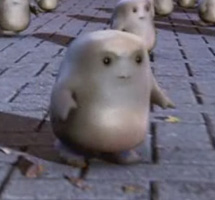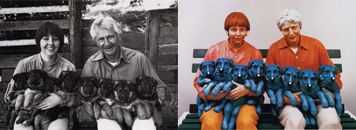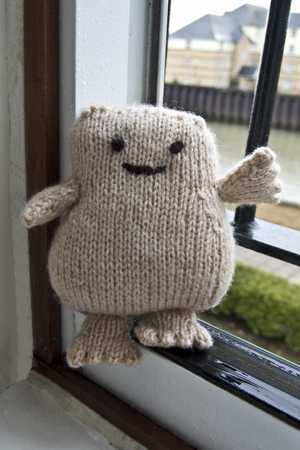Doctor Who: Partners in Copyright Crime
 The good people at the Open Rights Group forwarded me an email they received from a Doctor Who fan that goes by the screen name Mazzmatazz, who has allowed me to tell his/her story. But beware, this is a scary tale of copyright abuse that will have you hiding behind the sofa, or perhaps it will send you into a Whogasm.
The good people at the Open Rights Group forwarded me an email they received from a Doctor Who fan that goes by the screen name Mazzmatazz, who has allowed me to tell his/her story. But beware, this is a scary tale of copyright abuse that will have you hiding behind the sofa, or perhaps it will send you into a Whogasm.
Doctor Who series Four started a few weeks ago with the episode "Partners in Crime". The episode featured a new creature generated from human fat called, what else, the Adipose (pictured below). While I did not particularly like the episode, I reckon that the Adipose made a good showing, and will probably become a memorable Doctor Who creature (much better surely than the lovable yet ludicrous Abzorbaloff). The Adipose however, seem to me to be the Doctor Who equivalent of Ewoks - small and cute creatures which serve little purpose to the plot, and whose value seems to be mainly as merchandising fodder (I notice that others agree).
Enter Mazzmatazz. Mazz has a website featuring photography and knitting. In a display of amazing knitting talent (and dare I say, too much time on their hands), Mazz has been making knitting designs of Doctor Who characters; see for example, the excellent Ood. Under normal circumstances, a fan who makes knitting designs of loved TV characters should not be the concern of copyright owners. However, these are not normal circumstances. The new Doctor Who series is merchandising gold, so much so that the BBC has been climbing up the world merchandise chart. This may confuse people in and outside of the UK. The BBC is not a commercial enterprise, is it? We in the UK have to pay licensing fees (costing a whooping £139.50 GBP per year) to support public broadcasting, so why are the BBC relying so much on their merchandising? This is a good time to get acquainted with how the BBC works. While the BBC in the UK is free of advertising and supported partially by the licensing fee, expensive quality programs such as Doctor Who and Torchwood require investment that goes above and beyond guaranteed funding through licence fees alone. The BBC therefore has an international commercial body called BBC Worldwide, which sells its valuable intellectual property to the world entertainment market. The wide success of titles such as Planet Earth and Doctor Who have pushed BBC Worldwide's sales to more than £800 million GBP, and merchandising is a key part of that strategy.
This is a good time to get acquainted with how the BBC works. While the BBC in the UK is free of advertising and supported partially by the licensing fee, expensive quality programs such as Doctor Who and Torchwood require investment that goes above and beyond guaranteed funding through licence fees alone. The BBC therefore has an international commercial body called BBC Worldwide, which sells its valuable intellectual property to the world entertainment market. The wide success of titles such as Planet Earth and Doctor Who have pushed BBC Worldwide's sales to more than £800 million GBP, and merchandising is a key part of that strategy.
Where does our friend Mazz fit in this picture of corporate success? Well, it seems that the Adipose knitting designs have hit a greed nerve somewhere at the Beeb. While I have a copy of the entire communication between Mazz and the BBC, I will reproduce it partially because the emails come with a confidentiality disclaimer (although I must point out that I believe, as others do, that those email disclaimers are not even worth the bits they are written on). The cease-and-desist letter reads:
"We note that you are supplying DR WHO items, and using trade marks and copyright owned by BBC. You have not been given permission to use the DR WHO brand and we ask that you remove from your site any designs connected with DR WHO. Please reply acknowledging receipt of this email, and confirm that you will remove the DR WHO items as requested."Interesting choice of words to say the least. Further communication continues to stress the point that Mazz's designs constitute unlicensed merchandise, and that BBC Worldwide has every right to stop others from distributing their property. However, Mazz is not selling merchandise, he/she is providing a knitting design to tell others how to make their own versions of the Adipose. While commercial exploitation has no bearing on whether there is copyright infringement, I think that it should be a huge consideration for BBC Worldwide when deciding to prosecute a fan who clearly loves the show.
What about the legal argument? Does the BBC have a case? On the face of it, the BBC would be correct in their assessment that Mazz is infringing their copyright. TV characters are protected by copyright, and all sorts of fan art would be found to be infringing. However, there is a growing body of literature on the subject of the uneasy interaction between fandom and copyright, as many authors turn a blind eye to non-commercial use of their characters online. Of course, when the work becomes commercial, they will take action.

However, Mazz's case is more complicated, as copyright is less clear about transformative art. Nobody would claim that Andy Warhol does not have copyright over his iconic Marilyn portrait, or his Campbell's Soup montages, even if they use other's IP. Similarly, there have been various cases where the mere transformation for artistic purposes from one medium to another was deemed to have enough originality to warrant its own copyright protection (see for example Alfred Bell v Catalda). However, copy too much and you might be found to be infringing, the prime example is Roger v Koons, pictured above. While U.S. cases seem to be moving against transformative copyright, the same cannot be said for case law here in the UK.
 My first reaction when I read about Mazz's knitting case was that this was straightforward infringement, but something kept nagging me. I asked our resident copyright expert Charlotte Waelde, and she remembered some case law which blurs the picture even more. In King Features Syndicate v Kleeman [1941] AC 417, the defendant was accused of having copied cartoon strips depicting "Popeye the Sailor" and placing them in brooches and other media. Although the defendants lost, the issue of the independent design was explored. The Lords found that the figures could constitute designs as protected in the then Copyright Designs and Patents Act 1907. Another relevant case is Anacon v Environmental Research Technology [1994] FSR 659. This case has nothing to do with art, but with circuit design. In this case the defendants made a list of the components in a circuit and their interaction with one another, and then made a circuit on its own that looked completely different to the original. The defendants claimed that the their design was artistic, and therefore different. However, Jacob J found that the actual list was a literary work, and therefore it was subject to copyright protection as such. This is relevant to Mazz's design, as it proves that a knitting design is subject to its own protection, and that it may be dissimilar to the actual artistic depiction of the character. This issue was also explored in Sandman v Panasonic, where Pumfrey J astutely described the dichotomy between design and the item resulting from it to that of musical notation and the resulting tune. Each has its own type of protection.
My first reaction when I read about Mazz's knitting case was that this was straightforward infringement, but something kept nagging me. I asked our resident copyright expert Charlotte Waelde, and she remembered some case law which blurs the picture even more. In King Features Syndicate v Kleeman [1941] AC 417, the defendant was accused of having copied cartoon strips depicting "Popeye the Sailor" and placing them in brooches and other media. Although the defendants lost, the issue of the independent design was explored. The Lords found that the figures could constitute designs as protected in the then Copyright Designs and Patents Act 1907. Another relevant case is Anacon v Environmental Research Technology [1994] FSR 659. This case has nothing to do with art, but with circuit design. In this case the defendants made a list of the components in a circuit and their interaction with one another, and then made a circuit on its own that looked completely different to the original. The defendants claimed that the their design was artistic, and therefore different. However, Jacob J found that the actual list was a literary work, and therefore it was subject to copyright protection as such. This is relevant to Mazz's design, as it proves that a knitting design is subject to its own protection, and that it may be dissimilar to the actual artistic depiction of the character. This issue was also explored in Sandman v Panasonic, where Pumfrey J astutely described the dichotomy between design and the item resulting from it to that of musical notation and the resulting tune. Each has its own type of protection.In other words, I strongly believe that BBC Worldwide's claims are over-reaching. While there could be infringement, I submit the hypothesis that Mazz has done enough transformation to the Adipose character to claim copyright over their design.
The cease-and-desist letter also makes a claim on trade marks. I know next to nothing about this subject, but I would be extremely surprised if BBC Worldwide had managed to register the "Adipose" mark. I did a quick search in the UK-IPO Trade Mark database and I could not find it registered.
Concluding, the BBC may not have a straightforward case if they decide to sue, and they could very well lose. I also believe that they are misplacing their energies pursuing a fan who has done nothing more than to display their love to the show by making a highly original design. While commercial use is not relevant to the infringement case, it should be noted that Mazz was not selling the design, and had actually licensed it under a Creative Commons licence.
So, will the real Adipose please stand up?
Update: I have been dusting off my copyright textbooks looking for more cases relevant to this issue. The important question to me is whether a design arising from a character is an infringement. I have not found anything specifically, but generally copyright protects an original work in most changes of form (say, if a 3D sculpture is made of a 2D image). However, instructions to make things, such as knitting patterns and recipes, are protected only as literary or artistic works, therefore, the item produced from such instructions is not infringing the original design (see Bridgid Folley v Elliot [1982] RPC 433). I have not found a single case however that answers the question of whether there is infringement if the form of the protected character is changed into instructions. Anyone out in the blogosphere know of such a case? Again, Sandman v Panasonic is the closest analogy that I could find, but it is not an exact match.

 del.icio.us
del.icio.us




18 comments:
Even if the BBC had registered 'Adipose' as a trade mark, there would be the defence from R v Johnstone that its use to identify the knitting pattern was not use in the 'trade mark sense', i.e. as a badge of origin, and so was not infringing.
Thanks Simon, that is a good point. I wonder if they are claiming the use of the Doctor Who brand on the website.
Would there be a difference for trade mark law if the site was called something along the lines of "Unofficial Doctor Who Knitting"?
The trouble then could be that the BBC might claim that Arsenal v Reed applied, if "Dr Who" was used as a 'badge of allegiance'. Even disclaimers about the origin might not help; Mr Reed made it very clear that his football scarves etc were not official Arsenal products, but he was still found to have infringed Arsenal's trade marks.
The law on this aspect of trade marks is a thicket of judgments that, if not actually contradictory, do not always sit well alongside one another.
Much as I love Koons the American case law doesn't apply here. In particular we can't claim Fair Use on the basis of transformation so I think the bar would be set much higher; the work would have to be nothing like the original.
I wasn't aware of the Popeye case in the UK so thanks for that. Any more examples gratefully received. :-)
Trademarks don't have to be registered, they just have to be declared and defended (although not as rabidly as some lawyers want to charge for), so absence of registration doesn't prove that the Adipose aren't a trademark. But I don't know much about character trademarks so how strong the BBC's claim is I couldn't say. They may be overreaching, they may be a product of the media's collective haullucination about rights, or they may be correct.
The website did say "Doctor Who" (check Google's cache...), so that might be the trademark.
Interestingly they seem to have tried using an NC CC licence at some point to assert that the designs weren't to be used commercially (again see the cache).
We really, really, really need transformative use in the UK...
Hello Rob.
I don't think I claimed that Koons applies in the UK, but that it is indication of the wealth of case law on the subject.
This case to me is a matter of originality. The threshold of originality is higher in the States, so the comparison with American law also breaks down there.
Every single use of a trade mark is not an infringement. For example, I am using the Doctor Who trade mark in my title. But as I say, I know next to nothing about trade mark law.
But originality is only a defense in copyright not trade mark. I think. (We need to get Simon to research this properly!)
Btw as someone originally invoved in this story (I told them to ask you :) , I think you're being a bit hard on the Beeb. They only got involved because someone who was given a knitting pattern for free (under the CC license) then tried to sell it on eBay. Apparently someon else on eBay disliked said party and notified the Beeb. (And before that apparently other fans had criticised the selling of what was meant to be a non-commercial artifact.) They are not therefore I think as it is now getting prsented through the blogosphere, aggressively defending their brand in Paramount style. POssibly if no commercial exploitation is involved in future they won't lift a finger - though who can say.
In fact, I think if the BBC hadn't responded they might have been found to have acquiesced in the use of their TM leading to its loss - that doctrine aplies to TM in the UK does it not, though not in copyright? But I Am Not A Trademark Lawyer.
My pesonal query is whjat if the knitting pattern had been of a baby sized David Tennant - and not dressed as Dr Who - rather than an Adipose? Can there be a TM in someone's face used on unofficial mechandise? My recollection is yes/no/maybe :)
Hmmm.... the plot thickens!
I noticed that some of the patterns were being sold on eBay, but to me that is irrelevant to the question. The interesting legal bit for me is whether the actual designs are infringing, and I am not so certain.
at a glance, l see no infringement in the knitting patterns: they are different enough from the trademark image.
The person selling the patterns on EBay was not the designer. In fact, the designer got the EBay auction shut down. (And a few days later, the BBC discovered she had posted patterns online. Huh.)
Bah the BBC are funded by us the public. And all this copyright talk is just sad. I've told the bbc so, not that I expect any answer. And if they do I'm sure it's the polite copyright talk. If you want to complain to:
http://www.bbc.co.uk/complaints/make_complaint_step1.shtml
Good luck
I'm curious if anyone has advice on who to contact to complain to at the BBC? I'm thinking if they get 1000 knitted mini Daleks in the mail from knitters around the world, they might take notice.
As a knitter, it's disheartening to see the BBC taking the hard line on this matter. There's a whole community of knitters and other crafters who creatively interpret and expand on shows like Dr Who. For the most part, these are dedicated fans sharing ideas for free with other dedicated fans. It's not just pattern designers who were selling on ebay who are affected, people who were giving patterns away for free are also feeling intimidated and taking their patterns down.
In the end, I don't see how this benefits BBC. It's not like I would even consider buying an Adipose stuffed plush or a Dr Who scarf - they're both things I could make myself. The only thing they've earned in the knitting community is a lot of bad press.
Intellectual property if theft. No way to reasonably claim that banning a knitting pattern encourages creativity. I imagine what will happen is that the BBC will buy the patterns itself and then licence their use to anyone who wants to knit.
An excellent post. Thanks for putting together such a thoughtful contemplation of copyrights and wrongs.
Cheers!
Felix
My wife promised our boys knitted Adipose, but the pattern had been stomped on before I could download it for her.
Somebody, somewhere must have a copy of the pattern - can anybody please help my wife keep her promise to our sons?
I assume the BBC will no longer feature segments on programmes like Blue Peter where they show viewers how to make things featured in TV programmes (e.g. the Tracey Island from Thunderbirds that they famously made)
Whilst I think that the BBC's initial response could have been more tactfully done, they really did not have any choice. Speaking as head of the UK branch of the licensing industry's trade association, LIMA, there are both commercial and quality concerns about this activity. Commercially, the BBC may have granted rights to third parties which these products infringe upon: not taking action could leave the BBC itself open to legal claims. There is also the well-justified desire to stop on line sales of unauthorised goods made using these patterns. However, the copyright/trademark issue is , I believe, secondary to that of quality and safety considerations. Licensing is often naively reported in the press as being responsible for 'tacky merchandise'. It is, in fact, the very process of permission/approval that is at the heart of licensing that prevents poor quality goods from going on sale. If goods are allowed to be made and sold without the BBC's inspection and approval, we could, indeed, see the public parting with hard-earned money for poor quality and even unsafe items.
Now that this is in the hands of the BBC's licensing department, I'm sure that a sensible conclusion will be reached.
While Mr. Gardner's point about unsafe goods is well-taken in the abstract, I regret to inform him that despite their fearsome appearance, none of the knitted monsters are ACTUALLY capable of firing deadly laser beams, conspiring to destroy humanity, nor wandering off with their owners' body fat.
can you go to my website its www.doctorwho-alex.blogspot.com
Post a Comment